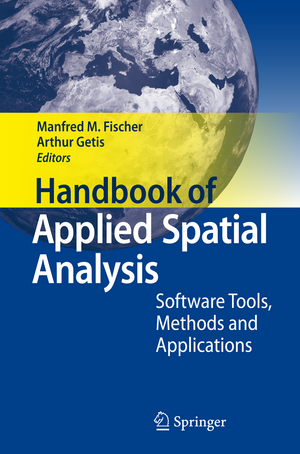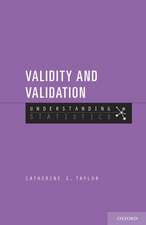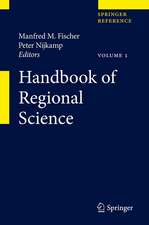Handbook of Applied Spatial Analysis: Software Tools, Methods and Applications
Editat de Manfred M. Fischer, Arthur Getisen Limba Engleză Hardback – 16 dec 2009
| Toate formatele și edițiile | Preț | Express |
|---|---|---|
| Paperback (1) | 1220.93 lei 6-8 săpt. | |
| Springer Berlin, Heidelberg – 31 oct 2014 | 1220.93 lei 6-8 săpt. | |
| Hardback (1) | 1225.40 lei 6-8 săpt. | |
| Springer Berlin, Heidelberg – 16 dec 2009 | 1225.40 lei 6-8 săpt. |
Preț: 1225.40 lei
Preț vechi: 1494.39 lei
-18% Nou
Puncte Express: 1838
Preț estimativ în valută:
234.59€ • 241.26$ • 194.61£
234.59€ • 241.26$ • 194.61£
Carte tipărită la comandă
Livrare economică 19 februarie-05 martie
Preluare comenzi: 021 569.72.76
Specificații
ISBN-13: 9783642036460
ISBN-10: 3642036465
Pagini: 828
Ilustrații: XV, 811 p.
Dimensiuni: 155 x 235 x 48 mm
Greutate: 1.27 kg
Ediția:2010
Editura: Springer Berlin, Heidelberg
Colecția Springer
Locul publicării:Berlin, Heidelberg, Germany
ISBN-10: 3642036465
Pagini: 828
Ilustrații: XV, 811 p.
Dimensiuni: 155 x 235 x 48 mm
Greutate: 1.27 kg
Ediția:2010
Editura: Springer Berlin, Heidelberg
Colecția Springer
Locul publicării:Berlin, Heidelberg, Germany
Public țintă
ResearchCuprins
GI Software Tools.- Spatial Statistics in ArcGIS.- Spatial Statistics in SAS.- Spatial Econometric Functions in R.- GeoDa: An Introduction to Spatial Data Analysis.- STARS: Space-Time Analysis of Regional Systems.- Space-Time Intelligence System Software for the Analysis of Complex Systems.- Geostatistical Software.- GeoSurveillance: GIS-based Exploratory Spatial Analysis Tools for Monitoring Spatial Patterns and Clusters.- Web-based Analytical Tools for the Exploration of Spatial Data.- PySAL: A Python Library of Spatial Analytical Methods.- Spatial Statistics and Geostatistics.- The Nature of Georeferenced Data.- Exploratory Spatial Data Analysis.- Spatial Autocorrelation.- Spatial Clustering.- Spatial Filtering.- The Variogram and Kriging.- Spatial Econometrics.- Spatial Econometric Models.- Spatial Panel Data Models.- Spatial Econometric Methods for Modeling Origin-Destination Flows.- Spatial Econometric Model Averaging.- Geographically Weighted Regression.- Expansion Method, Dependency, and Multimodeling.- Multilevel Modeling.- The Analysis of Remotely Sensed Data.- ARTMAP Neural Network Multisensor Fusion Model for Multiscale Land Cover Characterization.- Model Selection in Markov Random Fields for High Spatial Resolution Hyperspectral Data.- Geographic Object-based Image Change Analysis.- Applications in Economic Sciences.- The Impact of Human Capital on Regional Labor Productivity in Europe.- Income Distribution Dynamics and Cross-Region Convergence in Europe.- A Multi-Equation Spatial Econometric Model, with Application to EU Manufacturing Productivity Growth.- Applications in Environmental Sciences.- A Fuzzy -Means Classification and a Bayesian Approach for Spatial Prediction of Landslide Hazard.- Incorporating Spatial Autocorrelation in Species Distribution Models.- A Web-based Environmental Decision Support System for Environmental Planning and Watershed Management.- Applications in Health Sciences.- Spatio-Temporal Patterns of Viral Meningitis in Michigan, 1993 - 2001.- Space-Time Visualization and Analysis in the Cancer Atlas Viewer.- Exposure Assessment in Environmental Epidemiology.
Recenzii
From the reviews:
“The Handbook of Applied Spatial Analysis provides an important summary of, and gateway into, the rapidly developing field of spatial analysis. It aims to provide both a useful guide for researchers at all levels in spatial analytic fields and a basis for more in-depth research. … certainly fulfils the expectations set out in its blurb. It provides a thorough … insight into contemporary spatial analysis that many with an interest in this field will find useful.” (James Cheshire, Environment and Planning B: Planning and Design, Vol. 37, 2010)
“It provides a comprehensive introduction to a variety of problems and methods that may be beneficial to students and researchers who intend to learn and apply spatial analysis techniques in their studies and/or research. More importantly, the book provides valuable breadth and depth in its treatment of many topics. … suitable for readers without substantial prior knowledge of spatial analysis. A book with such a combination of topics and qualities is a pleasant and valuable addition to the rich literature in this area.” (Changshan Wu, Journal of Regional Science, Vol. 52 (2), 2012)
“The editors have done an excellent job to bring together conceptual knowledge and application pursuits while empowering readers with the information they need to find these resources and try some of the included techniques using the examples to guide them. The book will be attractive to higher level students and professionals … . There are not many books as up-to-date with such a wide coverage of spatial analysis tools and techniques along with supporting resource information.” (Jeff Thurston, Sensors & Systems, July, 2010)
“The Handbook of Applied Spatial Analysis provides an important summary of, and gateway into, the rapidly developing field of spatial analysis. It aims to provide both a useful guide for researchers at all levels in spatial analytic fields and a basis for more in-depth research. … certainly fulfils the expectations set out in its blurb. It provides a thorough … insight into contemporary spatial analysis that many with an interest in this field will find useful.” (James Cheshire, Environment and Planning B: Planning and Design, Vol. 37, 2010)
“It provides a comprehensive introduction to a variety of problems and methods that may be beneficial to students and researchers who intend to learn and apply spatial analysis techniques in their studies and/or research. More importantly, the book provides valuable breadth and depth in its treatment of many topics. … suitable for readers without substantial prior knowledge of spatial analysis. A book with such a combination of topics and qualities is a pleasant and valuable addition to the rich literature in this area.” (Changshan Wu, Journal of Regional Science, Vol. 52 (2), 2012)
“The editors have done an excellent job to bring together conceptual knowledge and application pursuits while empowering readers with the information they need to find these resources and try some of the included techniques using the examples to guide them. The book will be attractive to higher level students and professionals … . There are not many books as up-to-date with such a wide coverage of spatial analysis tools and techniques along with supporting resource information.” (Jeff Thurston, Sensors & Systems, July, 2010)
Textul de pe ultima copertă
Spatial data are an important source of scientific information. The development of high capacity and fast desk and laptop computers and the concomitant creation of geographic information systems has made it possible to explore georeferenced or mapped data as never before. This Handbook summarizes, explains, and demonstrates the nature of current models, methods, and techniques particularly designed for the analysis of spatial data. The book is designed to be a desk reference for all researchers just getting into the field of spatial data analysis as well as for seasoned spatial analysts. Relevant references are given whenever possible to direct researchers to the most useful writings on the subject.
Unlike most compendia of this nature, the book starts out by exploring the available software for spatial analysis. We focus on the tools that make analysis possible. The volume then describes briefly but clearly the many techniques embodied in the fields of exploratory spatial data analysis, spatial statistics, geostatistics, and spatial econometrics. In addition, attention is given to the methods used for the analysis of remotely sensed data. Finally, a number of example sections are included that demonstrate the application of spatial analysis in the economic, environmental, and health sciences. The wide range of approaches described helps readers better understand their data and the techniques needed for spatial analysis.
The volume features contributions from the very best scholars in the field. Their explanations are able to communicate the fundamental ideas of their subject area succinctly and accessibly.
Unlike most compendia of this nature, the book starts out by exploring the available software for spatial analysis. We focus on the tools that make analysis possible. The volume then describes briefly but clearly the many techniques embodied in the fields of exploratory spatial data analysis, spatial statistics, geostatistics, and spatial econometrics. In addition, attention is given to the methods used for the analysis of remotely sensed data. Finally, a number of example sections are included that demonstrate the application of spatial analysis in the economic, environmental, and health sciences. The wide range of approaches described helps readers better understand their data and the techniques needed for spatial analysis.
The volume features contributions from the very best scholars in the field. Their explanations are able to communicate the fundamental ideas of their subject area succinctly and accessibly.
Caracteristici
First comprehensive survey of most of the methods of spatial science Well written and understandable Features the very best scholars in the field Includes supplementary material: sn.pub/extras













